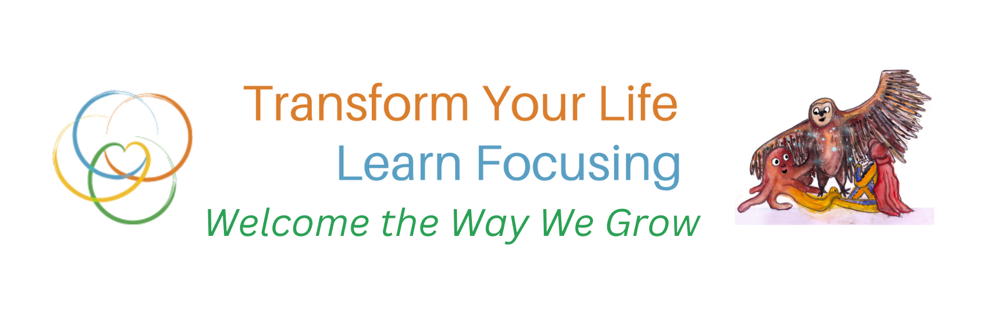Transform Your Life, Learn Focusing, Welcome the Way We Grow
How Do We Listen? How Could We Listen?
Posted on
By Barbara Dickinson

If you would like to listen to the audio version of this blog post, you can find it here.
One of the first things we can explore about interaction is cultural norms around listening.
Do our norms support healthy relationships? If we are talking about the cultural norm of listening to respond, then the answer may be “No”.
What do we mean by listening to respond? And what is the alternative?
The next time you are in a conversation, or observing a conversation, just notice whether the listener expresses understanding or curiosity to the speaker. Did the listener ask a clarifying question? Or offer sounds, words or short phrases, like Mm-Hm, or Oh! or I see, that indicate interest, attention, or curiosity?
If the listener did anything like this, they may be listening to understand. But if the listener replied to the speaker with their own experience of a similar (or a different!) situation, then the listener is listening to respond.
Which of these builds, or is constructive to, relationships? Which of these can damage relationships?
It depends, but the chances are higher for building with listening to understand, and the chances are higher for damage with listening to respond.
Why is that?
Well, for one thing, humans are generally wired for connection with other humans. In order to feel connected, it is important to have a sense that the other person in the relationship cares, supports, is interested, is curious, and remembers (at least to some degree).
Imagine you come home every night to the person with whom you live, and when you walk in the door, they say, “Now, who are you again?” How would that feel?
Of course, we are not talking here about dementia and related disorders, where memory is compromised. We are talking about ordinary, everyday relationships at home, among friends, at work, etc.
The same thing goes for remembering -- and acting upon -- shared engagements, schedules, appointments, commitments, and so forth.
 Remembering, showing interest, being genuinely curious, caring and supporting are the hallmarks of relationships that are constructive, building strength in a positive way.
Remembering, showing interest, being genuinely curious, caring and supporting are the hallmarks of relationships that are constructive, building strength in a positive way.
Imagine the most important person to you rarely remembers to attend appointments you schedule together. Take a moment to notice the feeling(s) -- the bodily felt sense -- you get when you imagine that. This sort of stress can damage the fabric of a relationship.
Then, imagine that same person always shows up on time and has a coffee for you as well! Take a moment to notice the feelings -- the bodily felt sense -- that accompanies this possibility.
What difference do you notice between the two scenarios and the feelings that come with them?
That may be the difference between “destructive” and “constructive”.
Let’s take this now to the realm of conversations in all walks of life. We are not trying to build close relationships with everyone we meet. But we are trying to connect for meaning, knowing, sometimes closeness, sometimes shared mission or vision.
Imagine for a moment a person you know with whom you want to strengthen connection. Then, imagine that almost every time you have a conversation, this person ignores what you say, no matter how important to you, and turns the conversation to their own topic.
How does that feel? Take a moment to notice. Chances are it feels uncomfortable in some way.
Now imagine that same person, but in this scenario, when you offer something -- a story about a current challenge you are facing, for example -- the person leans in, nods, follows the story closely with uh-huh’s and I see, and when you are finished says something like, “I get how important this is for you. I want to know more.”
How does that feel? Assuming “want to know more” is appropriate, does that feel better than the previous scenario?
This is listening to understand, and listening to build a connection, or maintain a connection, rather than listening to respond. 
In our work exploring interaction, we are applying skills, like empathy, curiosity, sensing the essence of “how it is” for another person, compassion, and symbolization, that help us listen to understand and build stronger, healthier relationships.
In future blog posts, and in our monthly Changes Meetings for Exploring Interaction (starting in March 2024), we will offer ways to learn more about these skills and the work on which they are based, Interactive Focusing.
- You can find our Monthly Changes Meeting schedule here.
- Read more about exploring interaction here.
- Resources about Interactive Focusing are found here.
 Until next time!
Until next time!
Quick links
Social Links
Explore Focusing experiences with our Learn Focusing community of writers on Substack.
JOIN our public Facebook Group for people interested in Focusing HERE.
LIKE our Learn Focusing Facebook page HERE.
SUBSCRIBE to our YouTube channel for more content HERE.
Sandy Jahmi Burg
540-552-0203
sandyjahmi@gmail.com
Floyd, Virginia
**Learn Focusing is certified as a Small, Women Owned Business in the Commonwealth of Virginia.
*DISCLAIMER*
This site does not provide medical or any other health care or fitness advice, diagnosis, or treatment. The site and its services are for informational purposes only and are not a substitute for professional medical or mental health advice, examination, diagnosis, or treatment.

Leave a comment: